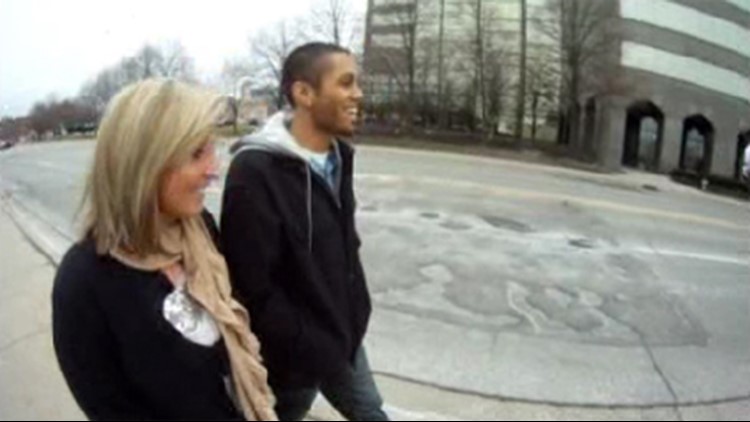UPDATE: 23-year-old Cara Crane died from an overdose Monday. Her family is making funeral arrangements Tuesday in Boone County. Her mother Michelle has requested a full toxicology report and says an autopsy is being done. Michelle says Cara had three overdoses in the past three weeks. Cara's 29-year-old old brother, Chad, was recently released from jail and is currently drug free.
ORIGINAL STORY:
John and Cara bravely came forward and talked with Eyewitness News in February 2012 to expose heroin in the heartland.
The friends from Boone County said they first tried heroin on a Lebanon High School Senior Skip Day.
"I remember it was the first time I stuck a needle in my arm," John said.
"I didn't know what heroin even was. The name that I was told when I first did this was 'Boy.' 'Boy' is what it was called," Cara said.
John showed the scar on his arm where he used to shoot up. Cara would ask other people to inject her.
"I would do it on my hands. I've done it on my feet before, just really anywhere where a good vein is," Cara said.
It cost $10 a hit. At the height of his addiction, John said he was using ten hits a day. Cara says the addiction started immediately.
"The first time I tried it, I got hooked instantly," Cara said.
John said he was good at hiding his habit. He believes his parents were unaware until he told them he was addicted. Both teens say the high was short-lived. The instant heroin rush disappeared just as quickly, leaving them feeling sick.
Eventually, they needed a daily hit - just to feel normal.
"I would wake up, that is all I would think about until I went to sleep that night," Cara said.
During the interview, John and Cara were upbeat. They felt lucky. Insurance had covered costly rehabilitation.
Their self-outing was likely, in part, a search for accountability to help them stay clean. Cara had a sponsor.
"When I feel like I am going to relapse, it's just like one phone call and I'm over it," Cara said.
John was more measured.
"Every single moment it worries me, because I know in the back of my head that I could go do it at any moment," John said.
That moment for John came six months later, setting off a downward spiral that led to where we found him today - in the Boone County Jail. He wore an orange jumpsuit for his interview in the jail.
"Eventually, you can run back into the drug. You can find it wherever you go. Ultimately, you just have to be willing to say no and, at that point, I wasn't 100 percent ready I guess," John said. "It's my own fault."
John is facing multiple possession charges. The most serious charge is a B felony for dealing heroin. He is accused of selling to an undercover agent earlier this month.
"I don't consider myself a major dealer. I'm a major user. I'm a major addict," John said.
John faces up to 29 years in prison and $40,000 in fines if he is convicted.
What about Cara?
It was three months after we met last year that she was arrested for burglary and theft.
"It's a hard addiction to kick. She started running around with the same people and one thing led to another and it just escalated," her mother Michelle Crane said.
Cara is now 19 years old and in prison. Crane says it's hard to relate.
"They wake up every morning and that is the first thing they think of is how they are going to get their fix for that day and if they don't have the money, they are going to go steal to get it," Crane said.
Major Aaron Dietz, who heads up the Hamilton Boone County Drug Task Force, agrees. He says the crime statistics are clear. When addicts live near you, you are more likely to be a target and the number of heroin-related arrests are growing.
In his jurisdiction, they've made 11 heroin related arrests in the first two months of 2013. That is compared to eight arrests in all of 2012 and none the year before.
"Unfortunately, we can't arrest our way out of the problem," Dietz said.
"Fifty-two percent of the folks we arrested last year were repeat offenders and that was one of highest years in the 24 years of the task force," Dietz said. "It takes over the person, that is the scary part. It's like being in the toilet bowl, you just can't quite pull themselves out."
Dietz has pictures of the heroin most recently confiscated here. It looks like small rocks wrapped in paper, or powder packed in balloons. One gram can be divided up to get ten people high at $10 a hit.
Crane knows the cycle. In fact, Cara's conviction and time in prison isn't her biggest worry right now.
"A part of me has a little bit of peace knowing that she cannot get drugs and you know that she is safe in there," Crane said.
But her 24-year-old son Chad is also addicted to heroin and she hasn't seen him in more than a week.
"I'm just waiting for that knock on my door," Crane said.
She's posted his picture and over the weekend visited abandoned homes in Indianapolis where she knows he's spent the night. He left a halfway house and now is in violation of his parole.
Crane hopes he's the next arrest.
"I want him to stay behind bars so he will stay alive," Crane said.
Her fears are fueled in part by a video she shot after recently picking up Chad. He told her he had just shot heroin into his neck. She witnessed horrifying reality of what a heroin trip looks like. His face was vacant. His mouth hung open. She panicked and starting pounding his chest, fearing he had overdosed right there in the front seat.
Crane took the video to show her son. She hoped it would scare him straight.
It didn't.
But she now reveals these raw and personal moments, hoping it may stop someone else who is tempted to try heroin.
"I don't know of anybody that has overcome a heroin addiction," Crane said.
Dietz says the task force is trying to catch heroin dealers, but the solution starts much earlier.
"We have got to kill the demand. It is the only way to choke it out," he said.
John's arrest is part of the increased law enforcement effort to address the heroin problem. But John says taking him off the streets will have little impact on what he says is a thriving heroin business here.
"I hope they just don't think that just because I'm in here that the problem is gong to stop, because it's not even close, not even near," he said.
When asked if people are lining up to take his spot, "there are already plenty of people in my spot," John said.
John's trial is set for May. He promises the next time we meet, it is going to be a "good situation."
Cara hopes to attend beauty school after she is released in December.
"I am fearful for her when she does get out," her mother said.
The environment will be the same, but after time in prison, maybe Cara will stay clean.
Tips from the Hamilton-Boone County Task Force about recognizing heroin use:
- Small Rocks Folded Up in Paper or Foil
- Look for powder or residue. One hit is roughly the amount of powder you would find in a package of sweetener for your coffee.
- Look for bits of cut balloons, or corners of baggies in waste cans.
- Shoestrings stuffed in pockets, or shoes with out shoestrings. The shoestrings are used to tie around the veins for injections.
- Look for cans or spoons with burn marks.
- Kids who don't smoke carrying lighters.
- Kids wearing long sleeves when it is hot out to cover up needle tracks.
- Money or household valuables have gone missing.
- Behavior changes or kids who seem sick for no reason.



